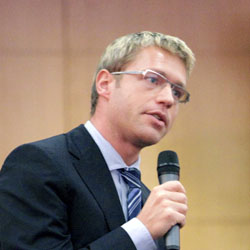Football in Germany: A Model Case for Addressing Match-Fixing? Michael Pedersen
October 29, 2013
Along with doping, many sport leaders now consider match-fixing a critical athletic governance challenge facing sport federations, across sports and nations. What is ultimately at stake is the trust in a sport – and so a sport federation’s ability to build growth and performance into the future.
This 7th contribution of mine for iSportconnect’s expert column on sport governance offers perspectives on the case of German football in addressing match-fixing, including measures of preventive, detective and sanction governance. The contribution also offers some challenging questions for sport leaders to consider, as they start the process of modernizing their governance standards for the future.
My 8th contribution is going to be published in the middle of November. It will offer perspectives on ‘sport in society’ governance with a focus on a Colombian project called Colombianitos. The project engages underprivileged children in Colombia in doing sports such as football, badminton and table tennis.
Match-fixing is a threat to the fabric of sport and a complex challenge
A case of match-fixing occurs when someone knows what will happen in a match, game, race or another kind of sport competition ahead of time and makes use of the information for private gain. It typically involves criminals bribing an athlete, a referee or a club official to fix an act of underperformance in a specific sport competition, for the criminals to benefit from placing a bet on the act occurring. In football, for instance, acts that it is often possible to place a bet on include the outcome of a particular match, the number of goals scored, goal difference, yellow or read cards, fouls, corners or penalties in the match.
As is the case with doping in sport, match-fixing is now widely acknowledged as a critical athletic governance challenge facing sport federations. Not only does match-fixing pose a threat to the fabric of sport. What is ultimately at stake is the trust in a sport and so the ability of the sport federation governing it to build growth and performance into the future. No one wants to be associated with a sport that is known for fixed results of competitions. Be it amateurs and professional athletes doing the sport or the wider general public watching the sport. Be it sponsors and media broadcasters. Be it governments providing funding for sport.
The complexity of the match-fixing challenge is profound. No sport federation is in a position to effective address match-fixing on its own in the sport that it oversees. The challenge is global in scope, reflecting the nature of legal and illegal betting markets for almost any sport, not least online. In many cases common approaches and adequate solutions are yet to be fully developed. One of the biggest challenges is that effective solutions require a lot of different stakeholders coming together, nationally and internationally.

Key stakeholders of German football work together to address match-fixing
Since 2005, the German Football Federation and the Professional German Football League have been collaborating to address match-fixing in German football. The efforts are supported by Transparency International, the German Government’s Federal Centre for Health Education and the German Football Players’ Union, among others. They include measures of preventive, detective and sanction governance.
Preventive governance measures include training and clear rules for key players in football
Under the motto ‘your sport, your career, your responsibility’, preventive governance measures include training tools such as e-learning and written material. Training is provided to professional players, coaches, referees and football club staff and close relatives of these players in German football. The training tools are custom-made for specific target groups and include an outline of the nature of previous cases of match-fixing in German football and the consequences to players and referees in terms of facing sanctions such as fines and exclusion from professional football.
Besides of applicable rules and regulations in German law that relate to illegal betting and fraud, the German Football Federation has specific rules in place that football players, coaches, referees and club officials are required to comply with. These rules are also referred to in their contracts. For instance, football players are not allowed to bet on matches of their own clubs and matches in the league(s) that their clubs are playing in. Referees are not allowed to bet on any football matches whatsoever. These rules apply to family and friends too, in the sense that these key players in German football are not allowed to ask anyone to make bets on their behalf.
The advice provided to key players in German football is summarized in the following seven guiding principles:
1) Do not make bets related to your sport
2) Do not ask others to make bets on your behalf
3) Your knowledge is valuable – safeguard it
4) Avoid foul play
5) Trust yourself
6) Think about your career
7) Think about your team too



